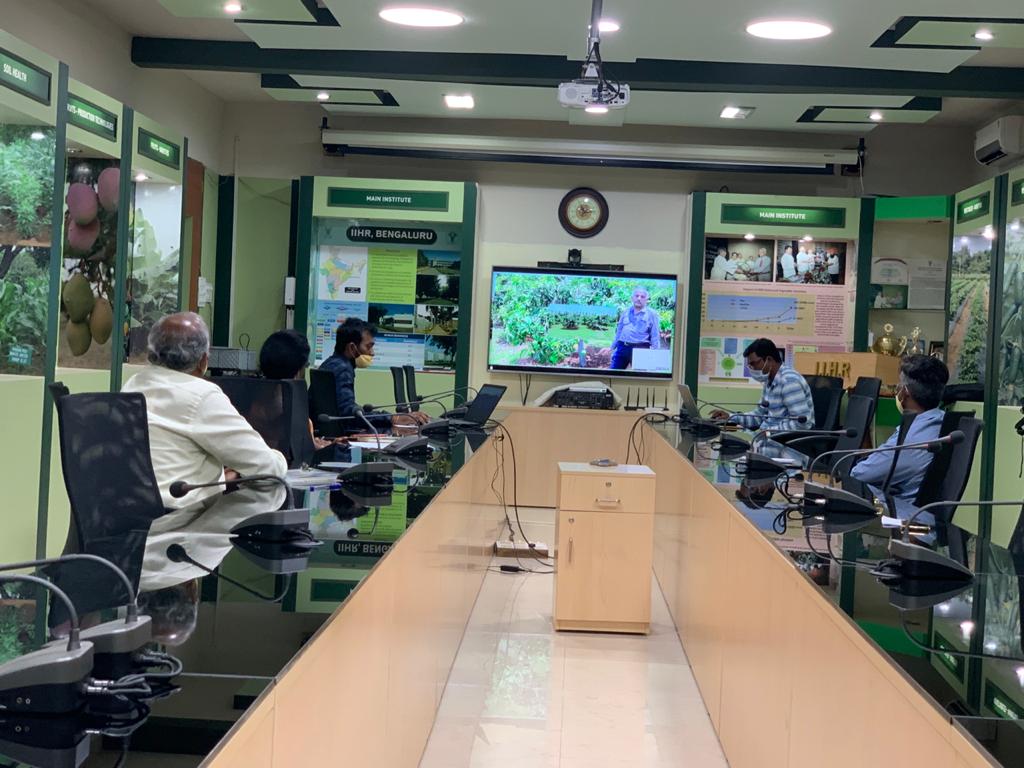
A Webinar meeting on Technology Dissemination to boost horticulture sector during the post Covid was convened by ICAR-IIHR and DDG (Hort. Sci.) on 12th May, 2020 at 11.00 am. It was attended by Director of Extensions UAS, Bengaluru; UAS, Raichur; UHS, Bagalkot; UAHS, Shivamoga; Directors of ATARI, Bengaluru; Pune; Jabalpur; Kolkata; Hyderabad; Kanpur; Ludhiana and KVK’s coming under these ATARIs; Director and Scientists of ICAR-IIHR. In total, there were 255 participants for the meeting.
The programme started with the formal welcome by Dr. T. S. Aghora, PS and Nodal officer, PME cell of IIHR. Dr. M.R. Dinesh, Director, ICAR-IIHR in his opening remarks emphasized that there is need to disseminate the recent technologies/ high yielding varieties or hybrids through KVKs to boost the income of the farmers. Quality seed and planting material production can be increased to meet the existing demand
In the meeting , four technologies viz., new mango hybrid, Arka Udaya, Mango High Density Orchard, Chilli hybrids Integrated Virus Disease Management in Chilli were introduced.
Dr. M. Sankaran, Principal Scientist highlighted the salient features of mango hybrid Arka Udaya, which comes to harvest during July end and August first week. It is suitable for processing as it has a TSS of 24o Brix and the pulp is very firm, an eight year old plant has the yield potential of 35-40 kg /plant.
Dr. Reju M. Kurian, Principal Scientist and Head, Division of fruit crops presented the mango high density orchard system for the variety Alphonso with a spacing of 4m x 2.5m and associated canopy management practices for realizing high yield. With this method, 1000 plants/ha can be accommodated. It was demonstrated that a five year old plant can give an average yield of 10 kg/plant, which amounts to 10 t/ha.
Dr. K. Madhavi Reddy, Principal Scientist made a presentation on significant features on chilli hybrids/ varieties developed at ICAR-IIHR. She emphasized that in recent years, there is severe incidence of leaf curl virus in major chilli growing areas of Central and South India. In view of this, ICAR-IIHR has developed ten different chilli hybrids with resistance to chilli leaf curl virus, which are suitable for different market segments. The seed production of these hybrids have been initiated and hybrids will be made available for demonstration by December 2020.
Dr. M. Krishna Reddy, Principal Scientist and Head (I/C), Division of Plant Pathology presented the Integrated Virus disease management in Chilli. The Integrated approaches at nursery stage include, raising of seedlings of virus resistant varieties/ hybrids on raised seed bed prepared with FYM+ Neem cake enriched with Trichoderma, Seed Pro and AMC under Nylon net cover (40-60mesh) or seedling protrays raised in Nylon net cover, followed by spray of systemic insecticides before transplanting. In the main field, sowing of two rows of border crop of maize 10 days prior to transplanting of chilli seedlings followed by mulching with agri- silver sheet. After transplanting, at weekly or 10 days interval, spray of pesticides on rotation like acephate (1.5g/l) +neem oil followed by spinefermin @ 0.5ml/l +neem oil or neem based pesticides @ 2.0ml/l followed by fipronil @ 1.0ml/l+ neem oil followed by imidacloprid @ 0.5ml/l+neem oil upto flowering and fruit formation stages. Two spays of Arka Vegetable Special @ 2.5g/l to be given at 30 and 60 days of transplanting. By following these practices, two to three-fold increase in yield of chilli can be achieved.
After the presentation, the participants from various KVKs and Directorates of Extension interacted with the experts regarding suitability of the technologies for their agro climatic regions. Further, participants enquired about the availability seeds of ICAR-IIHR varieties and hybrids. Director informed all the participants that there is provision for online purchase of seeds and planting material.
Finally, Webinar ended with vote of thanks by Dr. B. Narayana Swamy, PS, Div of Social Sciences and Training



